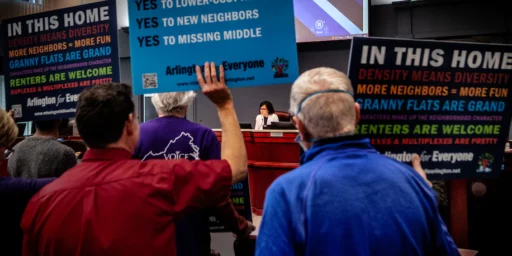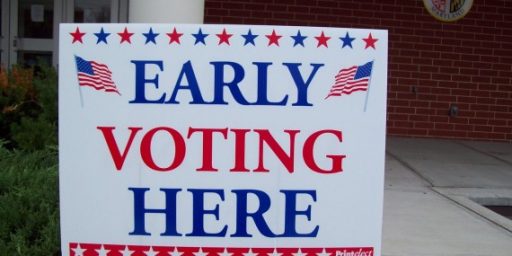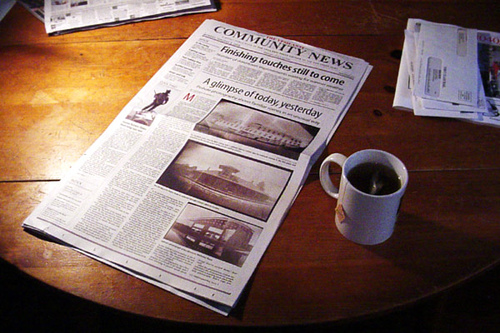DC Taxi Meter Politics is Local
Reacting to news that DC Mayor Adrian Fenty has ordered taxis to install meters, thus overturning the bizarre “zone” system unique to the District, Ezra Klein observes that this will have a profound effect in his daily life second only to the recent smoking ban for DC bars.
Local politics matters! And yet I spend all my time arguing for an expansion of health coverage that I already have, and an end to a war I’m in no danger of fighting. It’s weird.
Commenter Henry Evans cynically observes, “It’s not that weird. Your probability of having an impact on an actual policy outcome is so low that you might as well allocate your time based on your tastes rather than the impact of policies on you.”
My initial instinct was to agree but, in reality, we’re a lot more likely to have an impact on local politics than national, owing to both the numbers and the relative lack of big lobbying money working against us. School boards, utility commissions, zoning regulators, municipal councils, and others are far more likely to impact our daily lives and yet most of us are far more interested in national issues that have only theoretical impact on us. (To be sure, most people aren’t interested in politics, local or national, at all.)
The only explanation that comes to mind is that most of us interact with politics through the mass media and the national version does a better job at creating a sense of drama. It’s the difference between a high school talent show and “American Idol” or between community theater and Broadway.






I think there is an element of direct vs indirect impact. Winning or losing the war in Iraq is not likely to impact me personally, but would have a larger impact on the world (including the world my children will live in). Will there be an increase in terrorist attacks if there is a perception that AQ won in Iraq or will a free Iraq diminish terrorist attacks as it offers an alternative option in the Middle East.
Nationalizing health care will have a greater impact on me personally. Will I be able to see a doctor immediately if I have a chest pain or will I have to wait 17 weeks for an appointment as the access is rationed to meet budget constraints?
Changing how fares are collected on DC cabs will likely have short term impact for those living, working or visiting there, but long term the world will go on. Alternate transportation options will compete with the cabs and a new balance will be achieved.
One of the questions any political group has to ask itself is “is this the hill I willing to die on?” Is the issue at stake one that you are willing to have your political group stake itself to so that the future good (harm?) that your group could do is directly impacted by the outcome of the issue? So for Iraq and nationalized health care, I can see people saying this is such an important issue that we can tie the fate of the party to the issue. How DC cabs charge their passengers? Not so much a hill worth dieing on.
THEORETICAL? National tax policy will dictate how you spend your cash also. ME diplomatic policy affects whether your offspring or friends end up fighting a useless war. National decisions about health care determines how much you pay & the quality of the health care you receive. As a journalist, certain executive orders could definitely influence how honestly & freely you make your living & how important your vote, local or national, is. Deficit spending affects how much your kids can afford to help you out of a jam if you somehow fall out of your carefully planned safety net.
Sounds more real life than theoretical to me. While it is true that individually we can have a larger influence over local governments, I wouldn’t discount the effect of national policies on our daily lives either. One Federal decision can wipe out tens of thousands of local school board decisions. Brown v. board of education is an example.
Bob,
For most people, these things are largely theoretical. Tax policy, sure, but the changes are going to be marginal indeed for those making under $75,000 a year. We don’t have a draft, so wars mostly impact those who join the military. Even terrorist attacks are incredibly remote possibilities, especially if you live outside one of the top 5 metropolitan areas.
The stakes are higher. I think that the same principle applies as in winning the lottery: the odds of influencing the policy are low but the stakes are high. Note how many people keeping betting on the various lotteries week after week.
This is why I believe in the principle of subsidiarity. If we raise the stakes of the local where individuals matter more, we also raise the likelihood that people will get interested enough to participate.
I’ve spouted off for years we have more to fear from our local city council than from the federal government in regards to civil rights and privacy rights. Activists seldom march for the youth that got rough up by the police but are usually seen protesting the mere chance of illegal or legal surveillance.
The reality is we have responsibilities on both fronts. The big national issues and the local ones all deserve our attention.
But will Mr. Klein take part in the local issues that lack the drama he seems to desire so much?